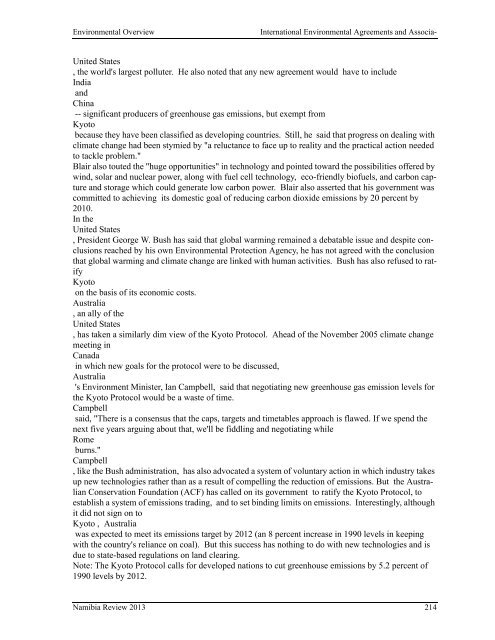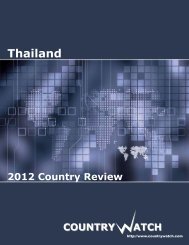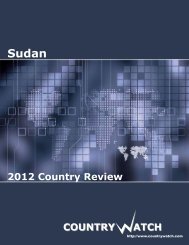Namibia - CountryWatch
Namibia - CountryWatch
Namibia - CountryWatch
Create successful ePaper yourself
Turn your PDF publications into a flip-book with our unique Google optimized e-Paper software.
Environmental Overview International Environmental Agreements and Associa-<br />
United States<br />
, the world's largest polluter. He also noted that any new agreement would have to include<br />
India<br />
and<br />
China<br />
-- significant producers of greenhouse gas emissions, but exempt from<br />
Kyoto<br />
because they have been classified as developing countries. Still, he said that progress on dealing with<br />
climate change had been stymied by "a reluctance to face up to reality and the practical action needed<br />
to tackle problem."<br />
Blair also touted the "huge opportunities" in technology and pointed toward the possibilities offered by<br />
wind, solar and nuclear power, along with fuel cell technology, eco-friendly biofuels, and carbon capture<br />
and storage which could generate low carbon power. Blair also asserted that his government was<br />
committed to achieving its domestic goal of reducing carbon dioxide emissions by 20 percent by<br />
2010.<br />
In the<br />
United States<br />
, President George W. Bush has said that global warming remained a debatable issue and despite conclusions<br />
reached by his own Environmental Protection Agency, he has not agreed with the conclusion<br />
that global warming and climate change are linked with human activities. Bush has also refused to ratify<br />
Kyoto<br />
on the basis of its economic costs.<br />
Australia<br />
, an ally of the<br />
United States<br />
, has taken a similarly dim view of the Kyoto Protocol. Ahead of the November 2005 climate change<br />
meeting in<br />
Canada<br />
in which new goals for the protocol were to be discussed,<br />
Australia<br />
's Environment Minister, Ian Campbell, said that negotiating new greenhouse gas emission levels for<br />
the Kyoto Protocol would be a waste of time.<br />
Campbell<br />
said, "There is a consensus that the caps, targets and timetables approach is flawed. If we spend the<br />
next five years arguing about that, we'll be fiddling and negotiating while<br />
Rome<br />
burns."<br />
Campbell<br />
, like the Bush administration, has also advocated a system of voluntary action in which industry takes<br />
up new technologies rather than as a result of compelling the reduction of emissions. But the Australian<br />
Conservation Foundation (ACF) has called on its government to ratify the Kyoto Protocol, to<br />
establish a system of emissions trading, and to set binding limits on emissions. Interestingly, although<br />
it did not sign on to<br />
Kyoto , Australia<br />
was expected to meet its emissions target by 2012 (an 8 percent increase in 1990 levels in keeping<br />
with the country's reliance on coal). But this success has nothing to do with new technologies and is<br />
due to state-based regulations on land clearing.<br />
Note: The Kyoto Protocol calls for developed nations to cut greenhouse emissions by 5.2 percent of<br />
1990 levels by 2012.<br />
<strong>Namibia</strong> Review 2013 214




